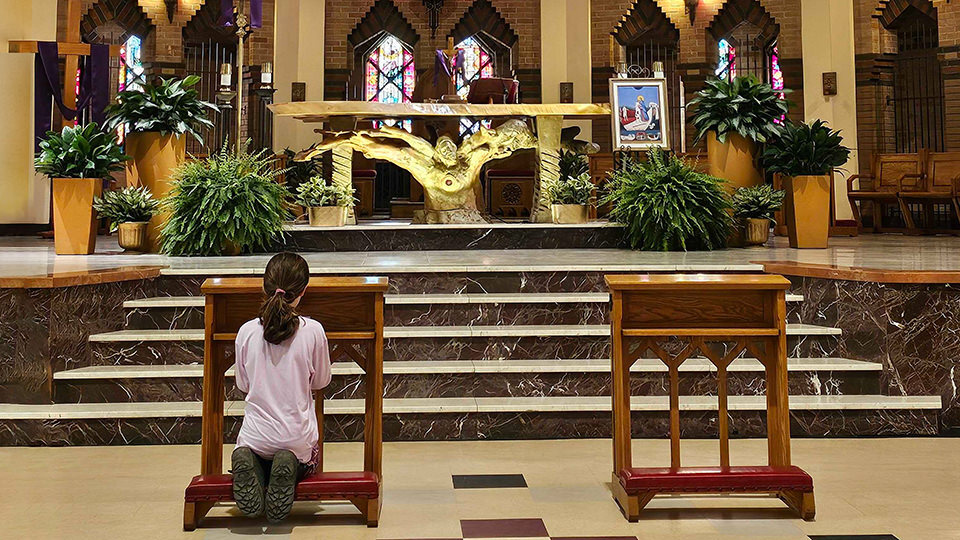

Raising your child like Carlos Acutis
Aline Haddad
Friday, April 11, 2025

My daughter praying at St. Maron's cathedral in Montreal.
Raising your child in the Christian faith is a beautiful challenge, but also a real trial in a world where digital distractions are all over. Every day, we face choices that influence how our children grow up, what they watch, what they learn, and what shapes their worldview.
My 9-year-old daughter made her First Communion last year, a moment filled with joy and meaning for her and for us. It was a time of grace, when she realized the importance of her relationship with God and the power of prayer. Until the age of 7, we chose to keep her away from screens, not out of any categorical opposition to technology, but because we wanted to offer her an environment where imagination, reading, games, and family exchanges took centre stage. We gave priority to bedtime stories, board games, and outdoor outings, and taking this time allowed us to forge strong bonds with her.
But today, reality is catching up with us. More and more of her friends own a tablet or a phone, spend time on online games, or watch videos all day long. When she comes home from school, she tells us that one of her classmates plays Roblox, that another has a favourite YouTube channel or Tiktok account, and that she sometimes feels left out because she doesn't know these references. Social pressure starts to build: “Why can't I do this when everyone else can?” Before demonizing screens, we've started to steer her towards more enriching applications and content: digital drawing, language learning, and of course, faith-based apps. But even with these solutions, the challenge remains. The lure of instant entertainment, viral videos, and online games is strong, and we must constantly accompany, explain and, above all, set an example through our own use of screens.
Carlo Acutis: a role model for connected youth
In this quest for a balance between faith and digital technology, one example comes to mind: Carlo Acutis. This young Italian, who will be canonized at the end of the month, is a fascinating role model for our times. Born in London in 1991, he grew up in Milan in an ordinary family, but quickly showed a particular attachment to the faith. From an early age, he had a deep devotion to the Eucharist and attended Mass daily, which is unusual for a child of his age. But Carlo was not a child cut off from the modern world. With a passion for computers, he taught himself to program, create websites, and use technology for a cause far greater than mere entertainment. At the age of 11, he embarked on an ambitious project: to create an online platform to record and document Eucharistic miracles from around the world. His goal was to share with as many people as possible the beauty and truth of Christ's Real Presence in the Eucharist, using digital tools to good effect. Despite his love of technology, he never let it absorb him to the detriment of his relationship with God and others. He was aware of the dangers of a life dominated by screens, and made a point of limiting his own use of technology. He often said:“The Eucharist is my highway to heaven,’’and also his now-famous phrase:
‘’All are born as originals, but many die as photocopies.”These words particularly resonate in a world where young people are often influenced by social networking trends, seeking to imitate rather than cultivate their own identity. At the age of 15, Carlo fell ill with acute promyelocytic leukemia. Despite the pain, he accepted his illness with unshakeable faith, offering his suffering for the Church and the Pope. He died in 2006, leaving behind him a powerful testimony to accessible holiness, rooted in everyday life and the virtuous use of technology. When I told my daughter about Carlo Acutis, she was intrigued. She read his story and was surprised that someone so close to her in age had managed to reconcile faith and technology in such an inspiring way. It got her thinking about her own use of screens and inspired her to learn more about how she too could use digital for something greater than mere entertainment.
How can we guide our children in an ultra-connected world?
Carlo Acutis' example has reinforced my belief that it is possible to use digital technology intelligently, without sacrificing Christian values. Rather than seeing screens only as a danger, I realize that they can also be a powerful tool for learning, creativity, and evangelization. But for this to happen, a clear framework and benevolent guidance are essential. Here are a few principles I try to apply with my daughter:1. Supervising and guiding screen use
A total ban on screens is no longer a viable solution when our children are growing up in a world where digital technology is part of their daily lives. Rather than banning technology altogether, we've chosen to frame it by setting clear rules:- Limit screen time and prioritize family time, such as mealtimes, free from digital distractions.
- Choose enriching content together, whether educational applications, documentaries, or cartoons with positive values.
- Involve the child in the choice of media, to teach him or her to discern what is beneficial from what is superfluous or harmful.
2. Encourage discussion of digital influences
Children are influenced by what they see online, whether on YouTube, social networks, or video games. Even without direct access to popular platforms, they hear about certain trends and want to understand what's going on around them. That's why I take the time to discuss the content she encounters with my daughter: Why are certain videos designed to capture our attention all the time? Why do so many young people want to imitate influencers? What are the dangers of viral challenges or online interactions? The aim is not to demonize digital media, but to awaken her critical spirit. I encourage her to ask me questions and express her feelings about the images and messages she discovers.3. Valuing off-screen time
Screens are captivating, but they shouldn't replace real-life experiences. That's why we've set aside time for non-digital activities:- Reading, to nourish imagination and reflection.
- Drawing and music, to express creativity.
- Outdoor play, essential for physical and emotional development.
- Prayer and participation in Church life, to help anchor her faith in everyday life.
4. Present positive role models
Another aspect that reinforces the importance of a Christian education is the impact it can have in difficult times. My daughter was bullied at school, and it was a particularly trying time for her. Seeing your child suffer because of others is an immense pain for a parent, and I looked for every possible way to help her overcome this. In the end, it was in catechesis class and in her faith that she found real inner strength. She discovered, through Bible stories and Church teachings, that even the saints went through trials and found comfort in God. The example of Jesus himself, who experienced injustice and rejection, helped her understand that she wasn't alone and that her worth didn't depend on how others looked at her. We also discussed Carlo Acutis' way of seeing things: he often said that our true purpose in life is to be close to God, and that what matters is not what others think of us, but how we choose to love and do good around us. Her faith helped her to regain her self-confidence, to forgive, and to move forward without letting the pain she had experienced define her. Today, she better understands that true strength lies not in popularity or the approval of others, but in inner peace and the certainty of being loved by God. In a world where influencers and celebrities often dictate trends, it's essential to offer children other inspirational figures. Carlo Acutis is a perfect example: a teenager with a passion for technology, but deeply rooted in his faith. I try to show my daughter that there are young people who use their talent for something greater than the simple pursuit of likes or views. Together, we read stories about contemporary saints, young people involved in humanitarian causes, and children who are making a difference around them. Also, prayers are very present on a daily basis, especially before going to bed. This bedtime prayer has become a meaningful ritual for my daughter. In his prayer intention for April 2025, Pope Francis stressed the importance of responsible use of new technologies. He urged that their use “should not replace human relationships,” but should “respect the dignity of persons and help to confront the crises of our time.” This reflection resonates particularly with our approach to accompanying our children in a digital world, ensuring that technology serves as a bridge to authentic relationships rather than a barrier. Christian education in the digital age is a challenge, but also an opportunity. By guiding our children with kindness and discernment, we can show them that technology is not a threat, but a tool that, used well, can help them grow in faith.Related Articles:
<<
SUPPORT LABEL
$50
$100
$150
$250
OTHER AMOUNT
DONATE
Receive our newsletters
Stay Connected
Receive our newsletters

Stay Connected









